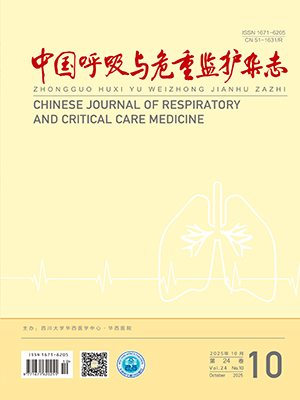| 1. |
Burbeto PD,Seam N,Groot S,et al. Rapid induction of autoantibodies during ARDS and septic shock. J Transl Med,2010,8:97.
|
| 2. |
Papathanassoglou ED,Movnihan JA,Dafni O,et al. Association of proinflammatory molecules with apoptotic markers and survival in critically ill multiple organ dysfunction patients. Biol Res Nurs,2003,5:129-141.
|
| 3. |
Steinberg J,Halter J,Schiller HJ,et al. Metalloproteinase inhibition reduces lung injury and improves survival after cecal ligation and puncture in rats. J Surg Res,2003,111:185-195.
|
| 4. |
Kuzkov VV,Kirov MY,Sovershaev MA,et al. Extravascular lung water determined with single transpulmonary thermodilution correlates with the severity of sepsis-induced acute lung injury. Crit Care Med,2006,34:1647-1653.
|
| 5. |
Martín Vivas A,Saboya Sánchez S,Patiňo Rodríguez M,et al. Hemodynamic monitoring:PiCCO system. Enferm Intensiva,2008,19:132-140.
|
| 6. |
Szakmany T,Heigl P,Molnar Z. Correlation between extravascular lung water and oxygenation in ALI/ARDS patients in septic shock:possible role in the development of atelectasis? Anaesth Intensive Care,2004,32:196-201.
|
| 7. |
邓宁,常为民,王春全,等.急性呼吸窘迫综合征患者血管外肺水的动态变化与预后的关系.中国呼吸与危重监护杂志,2014,13:528-531.
|
| 8. |
骆勇,贾文钗,王征,等.血管外肺水指数和胸腔内血容积指数在严重肺部感染合并感染性休克患者液体管理中的意义.中国呼吸与危重监护杂志,2013,12:344-348.
|
| 9. |
Hirotaka T,Isobe L,Kenji Okajima,et al. Inhibition of tumor necrosis factor production by urinary trypsin inhibitor. International Congress.Series,2003,12:69-74.
|
| 10. |
杨春辉,王璐,唐建国,等,乌司他丁对重度脓毒症诱导的ALI/ARDS模型大鼠肺组织中蛋白C及活化蛋白C含量的影响.中国临床医学,2013,20:447-449.
|
| 11. |
Nakatani K,Takeshita S,Tsujimoto H,et al. Inhibitory effect of serine protease inhibitors on neutrophil-mediated endothelial cell injury. J Leukoc Biol,2001,69:241-247.
|
| 12. |
陈昊,张丽葳,林兆奋,等.不同剂量乌司他丁对急性肺损伤大鼠MMP-9等炎症因子调控的研究.中国医药导报,2011,8:15-18.
|
| 13. |
王小伟,韦世奎.不同剂量乌司他丁治疗急性肺损伤的临床研究.医药与保健,2009,17:5l-52.
|
| 14. |
梁瑜.不同剂量乌司他丁治疗严重脓毒血症患者疗效评价.河北医药,2013,35:2116-2117.
|
| 15. |
许磊,郭东风,惠小平,等.乌司他丁对心肺复苏患者血液流变学影响及其预后的研究.中国血液流变学杂志,2007,17:148-251.
|
| 16. |
Tani T,Aoki H,Yoshioka T,et al. Treatment of septic shock with a protease inhibitor in a canine model:a prospective,randomized,controlled trial. Crit Care Med,1993,21:925-930.
|




